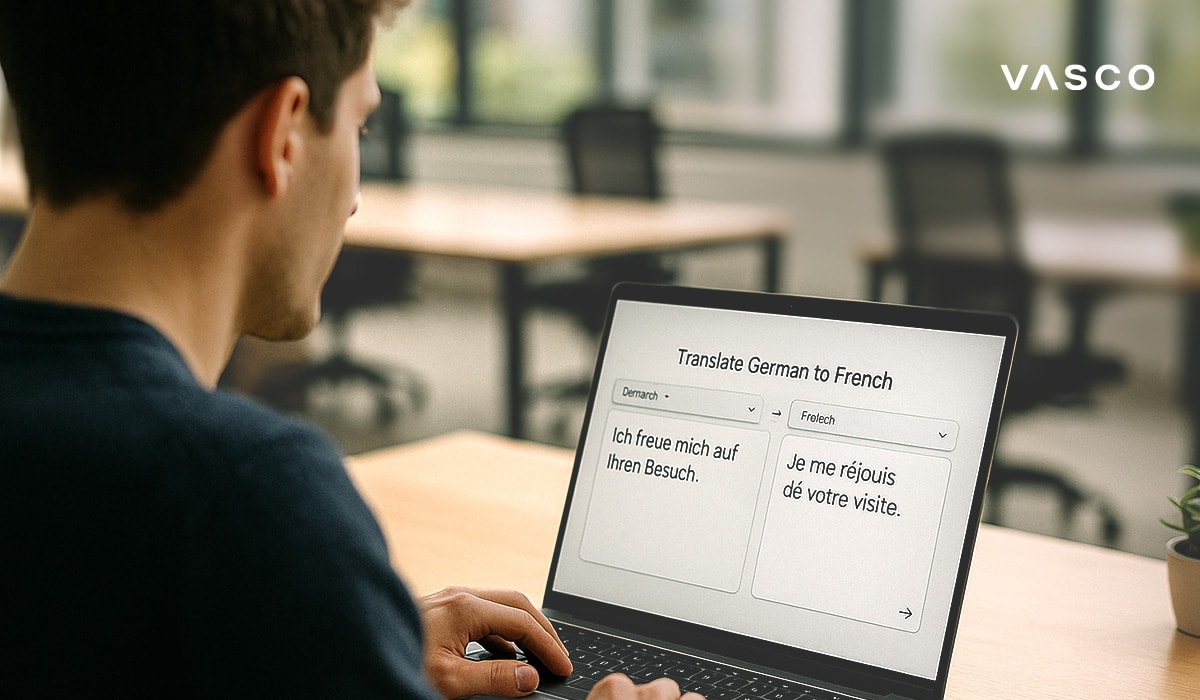Ever found yourself staring blankly at a German menu, hoping the waiter doesn’t notice your confusion? Or perhaps you’ve received an important email from a business partner and need to translate to German ASAP?
Table of Contents:
You’re not alone.
German language might sound intimidating with its seemingly endless compound words and unique grammar rules, but finding a reliable German translator doesn’t have to be a headache anymore.
In this article, we’ll explore some practical solutions that actually work in real-world situations.

FAQ:
What’s the best German translator?
How can I translate voice from German to English?
What is the best German voice translator?
Online Translation Options That Actually Work
Remember when online translations gave us more laughs than help? Those days are mostly behind us. Nowadays, modern online services that translate to German have come a long way from the word-for-word gibberish of the early 2000s.
Popular options like DeepL, Google Translate, and Microsoft Translator have dramatically improved their translation capabilities. DeepL in particular has earned a reputation as an exceptionally accurate German translator for capturing various nuances of this language.
Actually, the most accurate German translator platforms now consider German’s quirky features – like how nouns have genders or how Germans love creating massive compound words that English speakers would need an entire sentence to express.
For more specialized needs, there are professional platforms like Lingvanex and Systran that offer advanced features for business users looking to translate to German with greater precision.
AI Translations: Smarter Than You Might Think
AI translation has made impressive leaps recently. Modern tools, such as ChatGPT or DeepSeek, can now perform text translations and:
- keep track of context throughout entire documents,
- get better over time as they learn from corrections,
- handle business- & industry-specific terminology,
- handle specialized vocabulary for fields like medicine, law, or engineering.
It is, however, worth checking whether a given AI translator is trained on German language patterns. The difference in quality can be substantial compared to generic translation engines.

When Only Human Translation Will Do
For all the tech advances, sometimes you really need a human touch – especially for content where cultural nuances matter. A professional German language translator shines when dealing with:
- legal documents where precision is non-negotiable,
- marketing materials that need to resonate with German consumers,
- creative content that requires cultural adaptation, not just translation.
Best of Both Worlds: Hybrid Translation
Many savvy professionals now use a combined approach: instant translations by a machine for the first draft, followed by human review.
This method balances speed with accuracy and has become the go-to strategy for businesses using a translator to German for international communication.

Translation Devices for Real-Life Situations
Picture this: You’re standing in front of a Berlin train station information board, completely lost. That’s where German language translator devices come to the rescue. Many travelers now use them to
- translate images of train schedules, local newspapers, restaurant menus, and information boards,
- use a German voice translator for an instant foreign-language response,
- get specialized vocabulary for restaurants, transportation, emergencies, and more.
For example, the Vasco Translator V4 device has gained popularity as a reliable translator to German for frequent travelers – it’s designed specifically for on-the-spot translation challenges and works well even in noisy environments like busy train stations or crowded cafés.
It also features a built-in SIM card, which provides free and unlimited connectivity wherever there is a GSM connection.
Below, we also present you a table with all the language pairs you can translate with the Vasco electronic translator device:
| Language Pair | Voice Translator | Text Translator | Photo Translator |
| German to English | ✔️ | ✔️ | ✔️ |
| German to Spanish | ✔️ | ✔️ | ✔️ |
| German to Polish | ✔️ | ✔️ | ✔️ |
| German to French | ✔️ | ✔️ | ✔️ |
| German to Hungarian | ✔️ | ✔️ | ✔️ |
| German to Russian | ✔️ | ✔️ | ✔️ |
| German to Italian | ✔️ | ✔️ | ✔️ |
| German to Czech | ✔️ | ✔️ | ✔️ |
| German to Romanian | ✔️ | ✔️ | ✔️ |
| German to Afrikaans | ✔️ | ✔️ | ✔️ |
| German to Albanian | ✔️ | ✔️ | ✔️ |
| German to Amharic | ✔️ | ✔️ | ✔️ |
| German to Arabic | ✔️ | ✔️ | ✔️ |
| German to Armenian | ✔️ | ✔️ | ✔️ |
| German to Azerbaijani | ✔️ | ✔️ | ✔️ |
| German to Basque | ✔️ | ✔️ | ✔️ |
| German to Belarusian | ✔️ | ✔️ | |
| German to Bengali | ✔️ | ✔️ | ✔️ |
| German to Bosnian | ✔️ | ✔️ | ✔️ |
| German to Bulgarian | ✔️ | ✔️ | ✔️ |
| German to Burmese (Myanmar) | ✔️ | ✔️ | |
| German to Catalan | ✔️ | ✔️ | ✔️ |
| German to Cebuano | ✔️ | ✔️ | |
| German to Chinese (Cantonese) | ✔️ | ✔️ | ✔️ |
| German to Chinese (Mandarin) | ✔️ | ✔️ | ✔️ |
| German to Chinese (Traditional) | ✔️ | ✔️ | ✔️ |
| German to Corsican | ✔️ | ✔️ | |
| German to Croatian | ✔️ | ✔️ | ✔️ |
| German to Danish | ✔️ | ✔️ | ✔️ |
| German to Dutch | ✔️ | ✔️ | ✔️ |
| German to Dutch (Belgium) | ✔️ | ✔️ | ✔️ |
| German to English (Australia) | ✔️ | ✔️ | ✔️ |
| German to English (India) | ✔️ | ✔️ | ✔️ |
| German to Esperanto | ✔️ | ✔️ | |
| German to Estonian | ✔️ | ✔️ | ✔️ |
| German to Filipino | ✔️ | ✔️ | ✔️ |
| German to Finnish | ✔️ | ✔️ | ✔️ |
| German to French (Canada) | ✔️ | ✔️ | ✔️ |
| German to Frisian | ✔️ | ✔️ | |
| German to Galician | ✔️ | ✔️ | ✔️ |
| German to Georgian | ✔️ | ✔️ | ✔️ |
| German to Greek | ✔️ | ✔️ | ✔️ |
| German to Gujarati | ✔️ | ✔️ | ✔️ |
| German to Haitian Creole | ✔️ | ✔️ | |
| German to Hausa | ✔️ | ||
| German to Hawaiian | ✔️ | ||
| German to Hebrew | ✔️ | ✔️ | ✔️ |
| German to Hindi | ✔️ | ✔️ | ✔️ |
| German to Hmong | ✔️ | ||
| German to Icelandic | ✔️ | ✔️ | ✔️ |
| German to Igbo | ✔️ | ||
| German to Indonesian | ✔️ | ✔️ | ✔️ |
| German to Irish | ✔️ | ||
| German to Japanese | ✔️ | ✔️ | ✔️ |
| German to Javanese | ✔️ | ✔️ | ✔️ |
| German to Kannada | ✔️ | ✔️ | ✔️ |
| German to Kazakh | ✔️ | ✔️ | |
| German to Khmer | ✔️ | ✔️ | ✔️ |
| German to Korean | ✔️ | ✔️ | ✔️ |
| German to Kurdish | ✔️ | ||
| German to Kyrgyz | ✔️ | ✔️ | |
| German to Laotian | ✔️ | ✔️ | ✔️ |
| German to Latin | ✔️ | ✔️ | |
| German to Latvian | ✔️ | ✔️ | ✔️ |
| German to Lithuanian | ✔️ | ✔️ | ✔️ |
| German to Luxembourgish | ✔️ | ✔️ | |
| German to Macedonian | ✔️ | ✔️ | ✔️ |
| German to Malagasy | ✔️ | ||
| German to Malay | ✔️ | ✔️ | ✔️ |
| German to Malayalam | ✔️ | ✔️ | ✔️ |
| German to Maltese | ✔️ | ||
| German to Maori | ✔️ | ||
| German to Marathi | ✔️ | ✔️ | ✔️ |
| German to Mongolian | ✔️ | ✔️ | ✔️ |
| German to Nepali | ✔️ | ✔️ | ✔️ |
| German to Norwegian (Bokmål) | ✔️ | ✔️ | ✔️ |
| German to Nyanja (Chichewa) | ✔️ | ||
| German to Pashto | ✔️ | ✔️ | |
| German to Persian | ✔️ | ✔️ | |
| German to Portuguese (Portugal) | ✔️ | ✔️ | ✔️ |
| German to Portuguese (Brazil) | ✔️ | ✔️ | ✔️ |
| German to Punjabi | ✔️ | ✔️ | ✔️ |
| German to Samoan | ✔️ | ||
| German to Scots Gaelic | ✔️ | ||
| German to Serbian | ✔️ | ✔️ | ✔️ |
| German to Sesotho | ✔️ | ||
| German to Shona | ✔️ | ✔️ | |
| German to Sindhi | ✔️ | ||
| German to Sinhalese | ✔️ | ✔️ | ✔️ |
| German to Slovak | ✔️ | ✔️ | ✔️ |
| German to Slovenian | ✔️ | ✔️ | ✔️ |
| German to Somali | ✔️ | ✔️ | ✔️ |
| German to Spanish (America) | ✔️ | ✔️ | ✔️ |
| German to Sundanese | ✔️ | ✔️ | ✔️ |
| German to Swahili | ✔️ | ✔️ | ✔️ |
| German to Swedish | ✔️ | ✔️ | ✔️ |
| German to Tajik | ✔️ | ||
| German to Tamil | ✔️ | ✔️ | ✔️ |
| German to Telugu | ✔️ | ✔️ | ✔️ |
| German to Thai | ✔️ | ✔️ | ✔️ |
| German to Turkish | ✔️ | ✔️ | ✔️ |
| German to Ukrainian | ✔️ | ✔️ | ✔️ |
| German to Urdu | ✔️ | ✔️ | ✔️ |
| German to Uzbek | ✔️ | ✔️ | ✔️ |
| German to Vietnamese | ✔️ | ✔️ | ✔️ |
| German to Welsh | ✔️ | ||
| German to Xhosa | ✔️ | ||
| German to Yiddish | ✔️ | ✔️ | |
| German to Yoruba | ✔️ | ||
| German to Zulu | ✔️ | ✔️ | ✔️ |











